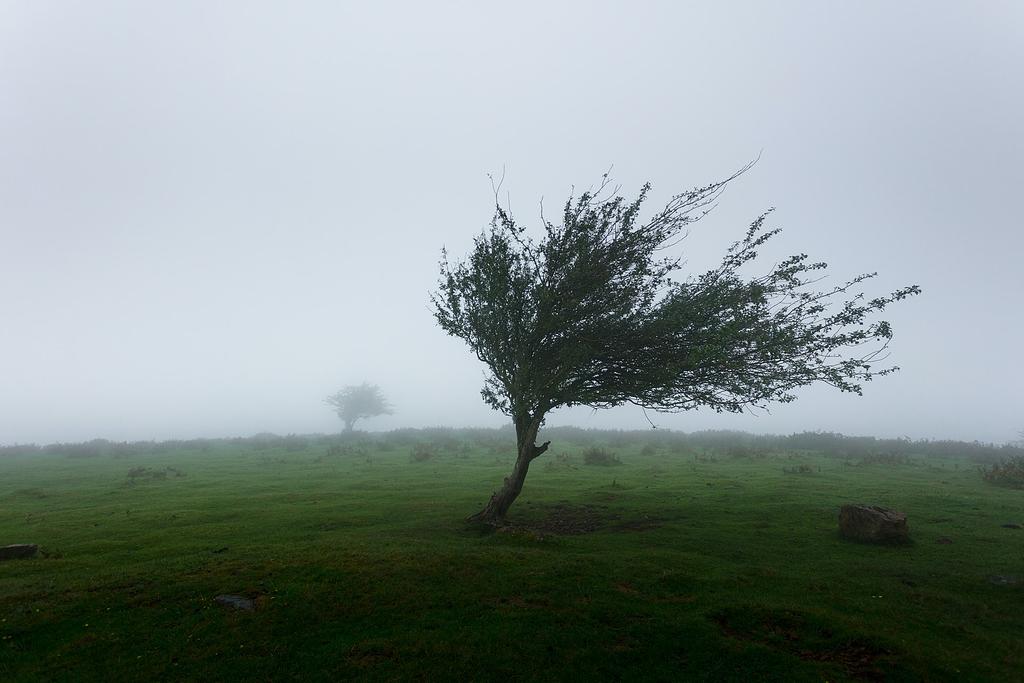[The Four Elements] Air

Have you ever tried to hike when the wind blasts with over 70 km/h? We did, and it's not as pleasant as a clear sky, the sun rising above our heads, and no wind at all. We still made it fun by imagining we can fly like birds by leaning gently towards the wind's opposite direction. We were leaning quite a lot at that speed, and the wind did not let us fall. It was a memorable experience.
We don't notice the air around us too often. We breathe in and breathe out, and it's happening without us being aware of it. Air moves around us, and depending on the currents, it can increase in speed, or it can be still. Just think of air as you would think of water. When you want to swim, you use your hands and legs to move forward or backward. Your body replaces water. The same goes for air. When you move from one place to another, you actually fill up the new space, and everything you leave behind becomes air again. It's unnoticeable because of its transparency, density, and ability to move like water.
What we do notice is when a change happens. Someone opens a few windows, the temperature drops or rises, we step into our homes from outside, or when there's a particular perfume or smell that goes past us.
Emotions in our minds work pretty much the same. They're barely constant. They change all the time. It's probably one of the reasons why some ancient cultures associated Air with our psyche. We can tame our chaotic minds through training like we would train our muscles at the gym. You can use apps like Calm, Waking Up, Headspace or others to train your brain muscles. There's even a great TED Talk from 2017 by Amishi Jha on how we can take control over our wandering mind.
A calm mind is like a room with ideal temperature and humidity when everything is operating optimally. If we don't have adequate room ventilation, carbon dioxide level increases, decreasing our productivity or impairing our decision-making.
Moving this concept to the company level, Air represents everything that surrounds it but can't be seen: the culture. What composes the company culture? It's the beliefs, how people interact with each other, the product presentation, tone of voice, etc. All these form your values. In order to have an ideal company "temperature", you should give special attention to how you work and how you divide work from personal life. Do you care enough about the people that work within your company? Do you conduct 1-on-1s with your team members? Do you discuss personal stuff during these meetings, or is it always about work? Are you pushing too hard on deadlines? How do you build rapport with your people and customers?
There's a false impression that we noticed in various companies today. They brag about their values, but when you start working there, that's almost nullified because stakeholders' pressure is high and deadlines, more often than not, unrealistic. People get burnt out and leave for a different company than prolong their high stress and workload levels. Toxic work cultures end up in endless backlogs, increased anxiety, endless backlogs, impulsive decision making, mistreated customers, and affecting people's lives.
Going from one company to another is similar to switching homes. We always make trade-offs. It's not easy to pack all your stuff and move it to the new house. There are some benefits in the new place that satisfy your needs better than your current location, making the trade-offs worth the hassle of moving. In a company, you might leave a long relationship of trust built with the cofounders. Still, you trade it for a shorter workday to give you the freedom to spend more time with your family or continue to pursue your hobbies. There might be times when you'll win on all fronts, but that's a rare opportunity that doesn't happen all the time, whereas decisions where you have to make trade-offs occur on a regular basis.
Even for entrepreneurs and founders, it's up to them if they want to be sucked into the VC rollercoaster and want to win big and then sell, but that won't make a better society in the long run and won't give the best example on how we can build a better world for tomorrow if everything we run after is money. The "profit at all costs" has become so ingrained in people's minds that we're on the edge of ruining entire generations for something so ephemeral.
We need to start creating better environments surrounded by well-being, gratitude, humbleness, and kindness. Collaboration begins when our career titles are put aside, and we behave like humans first. Everybody's opinion is considered and feels how it is to actively contribute to an idea, to a company's mission. Because let's face it, if the company does well, the people working there deserve it too.
A day at work is never the same, just as air is never constant. There are so many variables that come into place. People already come with emotional baggage that's influenced by factors independent of work. We can see how coming with a happy and joyful state at work is spread around us. If we're cranky or angry, the chances of having an outbreak at work over a minor issue increases. We can observe how the workplace is affected by our mood. More often, the opposite happens. The stress and pressure accumulated at work is released back home on our loved ones.
So how can we ensure the fluctuations of emotions aren't always in the extremes? By building a work environment that puts people first. As a leader, you must work on building trust and rapport with your employees. Establish clear boundaries between work and personal life. Care honestly for people's free time by ensuring they disconnect every once in a while. Try to reduce the number of hours in a workday, not increase them.
Good company values must not remain a poster on the wall. Instead, turn them into the Air that fuels the products, the people, and the customers.
Good company values must not remain a poster on the wall. Instead, turn them into the Air that fuels the products, the people, and the customers.
Air can be calm or cause havoc. It can be a light breeze at sea felt on our cheeks, or it can wipe out an entire island when it turns into a hurricane. It is not stable for long. It is always changing. But inside, in our homes, our companies, we have the tools to control it and work towards a steady, calm environment that can help us rise to our best self and a better world for tomorrow.
